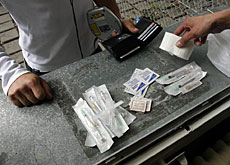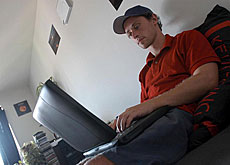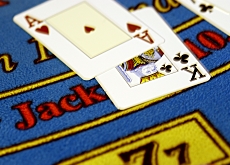Centre seeks to break “new addictions”

A treatment centre has opened in Geneva for so-called "new addictions" such as the internet, gambling and ecstasy.
The facility, said to be the first of its kind in Switzerland, has been set up by the city’s university hospital and expects to treat up to 60 patients a week.
Daniele Zullino, head of the substance abuse department at Geneva University Hospital, told swissinfo that the new centre aimed to fill a gap in the provision of health services for addicts.
He said existing treatments and programmes for classic patients with dependencies, such as heroin users or alcoholics, did not lend themselves to those hooked on gambling, surfing the internet or designer drugs.
“These people haven’t lost all connection with society but they are at risk of doing so. Therefore [treatment] is more focused on the addictive behaviour itself and less on the consequences,” said Zullino.
“When a heroin addict comes to us, usually we have to first treat infections, stabilise their social situation and so on. Only after several months can we begin to discuss the central point of the problem: the addictive behaviour itself.”
As a result, the programmes at the New Addictions, New Treatments centre, based in the Eaux-Vives part of the city, will be shorter than traditional addiction therapies.
The bulk of enquiries are expected to concern cyber addiction and cannabis use, though the centre has already received several requests regarding cocaine abuse since it opened earlier this week.
Cocaine abuse
Swiss and international studies say that between three and ten per cent of internet users are addicted to surfing. There are an estimated five million web users in Switzerland.
In August last year Zurich became the first canton to launch a campaign to combat internet addiction. According to Zullino, males aged 15-25 are most at risk.
“Internet addiction is not so much quantified by the amount of hours spent in front of a computer but the negative consequences,” he said.
“A user can spend just two or three hours a day but at the same time have problems with his wife or at work because of this behaviour. We would call it addictive behaviour if someone is unable to control it.”
Zullino said the team of psychiatrists, psychologists, nurses and social workers would be using an approach with addicts known as “motivational interviewing”.
This entails asking patients to evaluate the pros and cons of addictive behaviour, and the pros and cons of alternative behaviour.
“This may seem rather simple but I can tell you it’s not that simple for the patients themselves,” said the doctor. “It’s about giving patients the possibility of making decisions, because during addictive behaviour they don’t really do this – they act automatically.”
swissinfo, Adam Beaumont in Geneva
The centre offers treatment programmes for a wide range of addictions: the internet, gambling, designer drugs such as ecstasy, cocaine, cannabis and prescription drugs.
It is open three days a week – Monday, Wednesday and Friday – from 10am-7pm.

In compliance with the JTI standards
More: SWI swissinfo.ch certified by the Journalism Trust Initiative











You can find an overview of ongoing debates with our journalists here . Please join us!
If you want to start a conversation about a topic raised in this article or want to report factual errors, email us at english@swissinfo.ch.